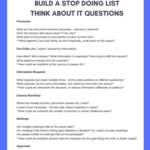Your people know how important (or not) they are to you. The very best leaders have a way of consistently connecting to their teams. Through this respect and admiration build. When this occurs, the sky is the limit.
Leaders who know what is most important demonstrate sincere appreciation and respect for the people in their organization. As a result, they build strong followership. The result, a team or unit that doesn’t quit regardless the mission.
I was feeling brave one morning, so I pulled up on the couch for the headlines of the day. Chris Jansen, an MSNBC news anchor, was about to close out a panel. She started by saying “thank you, Sergeant McCaffrey.” The problem – she was interviewing a 4-star general! She was embarrassed and quickly threw in a joke, “I just demoted you.”
General Barry McCaffrey said without hesitation, and deadly serious, “no, you did not. I only got to be a General because I listened to our fine sergeants.”
He is a leader who knows what is most important – serving and respecting his people.
I have no remembrance of what the news segment was. Several months later General McCaffrey’s comments remain in my head.
If you are short on time and would like a shareable, printable PDF of this article, click here.
Military 101
So, a quick refresher on the military terms. A sergeant is considered a non-commissioned officer. Barry McCaffrey went to West Point and retired a 4 Star general. The distance between these formal ranks is vast.
The speed of Mr. McCaffrey’s response spoke to his support and commitment to those who served under him. There was zero ego in his facial expression or body language. He demonstrated total and complete orientation to those he served, in this case, his sergeants. I am sure those in his command felt the deep respect and admiration he had for them every day.
How Does All This Translate?
I wondered, would a news anchor receive a comparable answer from a corporate executive in a similar situation. Or what if a senior leader got mistakenly referenced at one of their facilities as someone 5 or 6 levels down? Would they correct the person or align themselves with pride?
My other thought, what a tremendous example for leaders to emulate.
How does it translate in your world – do your front line people sense your respect for them?
Why Hierarchy Exists
The HBR Article, Why Hierarchies Thrive explains that “multilevel hierarchies remain the best available mechanism for doing complex work.”
The military is a well constructed, deeply layered hierarchy. It exists to ensure speed and crisp execution. The stakes are high for anything but flawless performance. The various ranks enable proper training and chain of command to facilitate execution.
At the same time hierarchy in the armed forces doesn’t supplant deep respect and servant orientation commissioned officers have for the rank and file. It is nearly impossible to find a general or any high ranking military official in active duty or retired who does not speak about the men and women in uniform with deep and sober respect.
Closer To Home
Titles and hierarchy in the corporate world, in theory, exist for the same reason – speed and crisp execution. In some cases, this bears out, in others it does not. Without intent, hierarchy makes large organizations slow and lumbering. Additionally, power is both intoxicating and disorienting. Leaders who know what is most important conscientiously work to ensure the ill effects of hierarchy and authority don’t manifest.
How many corporate leaders, senior teams and executives do you think would talk about their front line people with the same reverence as a four-star general?
Some do for sure. Many do not. Why is that? They are not evil people. Most care deeply about their business.
The main culprit – leaders get out of touch with the day to day and the people on whatever the front line. While most don’t lack respect for their people, it’s also not entirely apparent they do respect them.
Leaders Who Know What Is Most Important Also Know How To Spend Their Time
The challenging reality is the broader your responsibilities, the harder it is to stay connected to what goes on. This is a function of time and who/how you take in information.
Consider these two questions about time:
- How do you focus and prioritize your time?
- Who do you spend it with?
And these two about information:
- What information do you receive to stay you in touch with the workings of your organization?
- Who provides the information?
The answers reflect how you connect with and foster understanding of your people and our business.
A distilled, filtered or distant version of what goes on in your organization is a sure pathway to out of touch leadership. While not the intent, it is easy for leaders to get isolated from the truth.
On the flip side having an increased understanding that doesn’t improve the way forward, leaves people wondering if you listen or care. Active connectivity with your front line brings the realization that everything your people work on either isn’t adding value or is a drain on resources versus the value-add.
You inject energy back into the system by garnering their feedback and acting.
Get a tool to help you do this:
Respect As The Key Underpinning
Respect for those who carry out the work in your business comes from understanding who they are, what’s important to them, how they contribute and what you can do to best support them.
When in doubt, get out there.
Rarely if ever will you say, I wish I had spent less time with employees or with clients. When you engineer your day, week, etc. from that starting point, you lay the groundwork for understanding. From there, you plant the seeds for respect.
The recent Inc article Employees Are 32% Less Likely To Quit If They Get This One Thing From Their Boss hits on what respect matters.
The reason respect matters so much is that it’s both hard to fake and easy to recognize…it’s a series of small moments that add up to a big outcome.
Check out Why Binge Watching Undercover Boss Will Make You A Better Leader for a super revealing look at how executives are impacted by getting in the proverbial weeds of their organization.
The Answer Is YES For Leaders Who Know What Is Most Important
Back to the where we started this, what would your people say about you? Consider this single question:
Do your people feel a deep respect and appreciation from you?
If not, you don’t know or not to the extent you would like, find ways to get closer.
Planned encounters are good. Engaging in unexpected and personal ways sends a message stronger than anything you might say. Start (or continue) by being there regularly, fully present, understanding their work, struggles, needs, etc. As you deliver the gift of respect and admiration similar to that echoed by the General, you build something palpable and lasting.
I’ve learned that people will forget what you said, people will forget what you did, but people will never forget how you made them feel. —Maya Angelou
— EntreLeadership (@EntreLeadership) April 14, 2018





